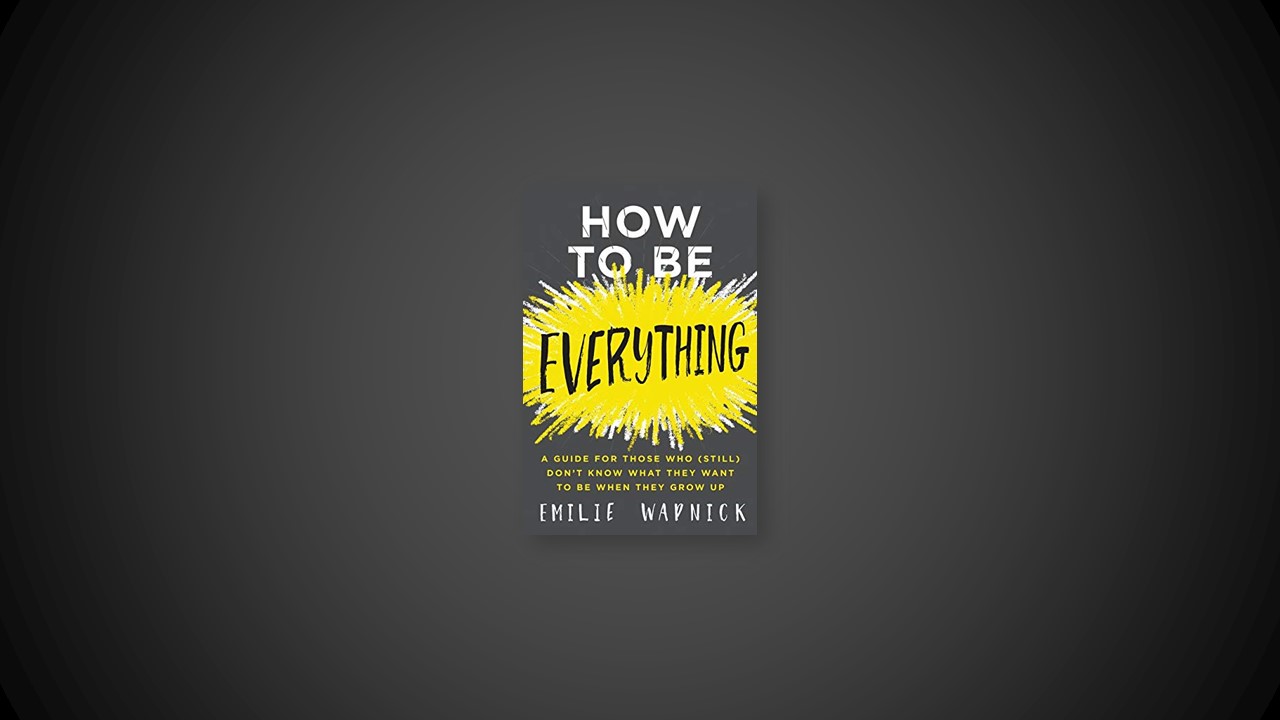There Is Nothing Wrong with You
The modern world isn’t always friendly to multipotentialites. As a result, many of us grow up with feelings of self-doubt, low self-esteem, and other mental health issues. Multipotentiality in teens is associated with depression, anxiety, overwhelm, existential dilemmas, and guilt about the inability to choose or about changing directions.
The truth is that you aren’t lacking a destiny or purpose. There is a very good reason for your insatiable curiosity: you’re someone who’s going to shake things up, create something novel, solve complex, multidimensional problems, make people’s lives better in your own unique way. Whatever your destinies are, you can’t step into them while stifling your multipotentiality. You must embrace it and use it.
Multipotentialites: Slackers or Innovators?
Not Being “The Best” Isn’t the Same as Being Mediocre
There is a middle ground between being world class and utterly mediocre. Although some of our interests are short-lived, multipotentialites are often highly skilled in a few areas. We may even be experts! A more accurate, albeit less pithy, expression to describe a multipotentialite might be: “jack-of-many-trades, master of some.” That said, it’s possible to make and do outstanding work by being proficient enough in a given area and combining that skill with creativity and passion.
Multipotentialite Superpower #1: Idea Synthesis
We are excellent synthesizers. Combining two or more concepts and creating something new at the intersection is totally our jam.
Multipotentialite Superpower #2: Rapid Learning
Multipotentialites grasp concepts and pick up skills quickly for three main reasons:
1.We understand how it feels to be a beginner (i.e., to fumble around in the dark)
We are passionate (almost obsessional at times) about the things that fascinate us.
We rarely start from scratch when pursuing a new interest, since many skills are transferable across disciplines.
Multipotentialite Superpower #3: Adaptability
Multipotentialites can make ourselves at home in many settings and roles. We can draw from our vast and varied skill sets, depending on the needs of our employers, clients, or customers.
Multipotentialite Superpower #4: Big-Picture Thinking
Multipotentialites are able to see how individual ideas connect to the wider world. We are big-picture thinkers who enjoy brainstorming, conceiving of lofty projects, and thinking up ways in which we can make things better.
Multipotentialite Superpower #5: Relating and Translating
Multipotentialites are natural connectors, both in the sense that we love connecting with people on an emotional level, and in that we love helping people understand and connect with one another.
The Components of a Happy Multipotentialite Life
What is the ideal career for a multipotentialite? Should we become architects, since architecture will allow us to use both sides of our brains and blend together the arts and sciences? Is project management the way to go, since it will let us focus on many things at once? Should we just reject traditional employment altogether and be our own bosses for maximum freedom and flexibility?
Unfortunately, there isn’t a single career path that is perfect for all multipotentialites.1
There are plenty of multipotentialites who have fulfilling professional lives as architects, project managers, and entrepreneurs, but many others for whom these careers would be a terrible fit. Although we may share an intense curiosity about numerous topics, multipotentialites are all different, and we each have our own interests, values, and priorities.
This Is About Life Design, Not Career Planning
In other words, this book is not about career planning. It’s about life design. That’s why it’s titled How to Be Everything, and not How to Make a Living Doing Everything.
Individual preference and the nature of our interests play a big part in how we choose to structure our lives and our careers. Ultimately, the important thing is that money, meaning, and variety are present in your life as a whole. Your career should be aligned with your overall goals. Your work should feel like an integrated and supportive force in your life, not the kind-of-awful-thing-you-have-to-do-to-pay-the-bills. With that said, let’s dive into each element to learn more.
- MONEY
Whatever your beliefs or issues around money—however essential or superfluous you consider it to be—most of us can agree that some amount of money is necessary. A helpful way to look at the need for money is what author John Armstrong calls the “ingredient approach.” Money can be seen as but one ingredient in a happy life. On its own, money isn’t enough. But when money is combined with other virtues (defined as “good abilities of mind and character”), it can empower us to meet our goals.
- We need money to live and flourish, but the amount varies dramatically from person to person.
- Money is just one ingredient in a happy life.
- It’s important to take note of our financial needs, goals, values, and circumstances when designing our lives.
- It can take time and experimentation to build a career that supports our multipotentiality. In the meantime, we should make sure that our basic survival needs are being met.
- MEANING
A powerful way to figure out what you find meaningful is to ask yourself a simple question: “Why?” Simon Sinek popularized this particular sense of the word Why in his influential TED talk “How Great Leaders Inspire Action.” He argues that the brands and leaders that we are drawn to have a strong understanding of why they do what they do, and they feature that Why front and center. We can do the same in our lives by identifying our own personal Whys—the driving forces behind our passions.
Knowing our Whys can help us create a narrative around seemingly disparate interests and provide a starting point to consider new career options. For instance, if we know that one of our Whys is simplifying complex ideas, then we might find a sense of meaning through teaching, illustration, and working in a field like science communication.
If one of our Whys is helping people feel safe, we might find a sense of meaning in psychotherapy, personal training, social work, and even insurance! Only by experimenting can we know whether a field or profession will give us this sense of meaning, but knowing our Whys can give us clues as to where to begin experimenting in the first place.
- Multipotentialites need a sense of meaning in our lives to be happy.
- There’s no official rule about whether or not an activity is meaningful, but we usually know it when we feel it.
- One way to identify the activities that bring us a sense of meaning is to figure out our Whys—the forces that motivate and move us.
- To figure out our Whys, we need to think about our past pursuits that gave us a sense of meaning. We should ask, not what these activities were, but why we enjoyed them. What was it that drew us in and made us feel alive?
- It’s okay to have more than one Why and for our Whys to seem contradictory.
- There is nothing wrong with doing something purely for fun or even purely for money, as long as we have the money and meaning that we need in our lives, overall.
- VARIETY
You’ve probably heard the saying, “Find something you love to do and you’ll never have to work a day in your life.” This advice is rather useless for multipotentialites, who by our nature, require variety to be happy. Even when we find something we love, we would be quite unfulfilled if we had to do it every day, forever.
However, mainstream career advice doesn’t typically recognize that variety is essential for some of us. It’s rare to find a career counselor who will be on board with helping you launch a career in two (or more) very different fields at once. Most career books aim to help you whittle down your choices to a single, “perfect” fit, instead of helping you come up with a multifaceted profession that combines your interests and lets you wear multiple hats. The need for variety is rarely acknowledged, let alone prioritized.
- Career advice doesn’t typically recognize the need for variety, although it is an absolute requirement for multipotentialites.
- Having enough variety means switching between different skills and projects at a frequency that feels right.
- The amount of variety we require is different for everyone and fluctuates over the course of our lives.
- The more interdisciplinary a project or field is, the fewer additional activities multipotentialites require to satisfy our need for variety.
- Experimentation is key. Pay attention to how you feel, and then add or subtract projects until you get the amount of variety that works for you.


